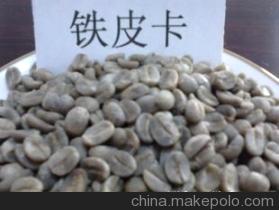Organic coffee beans grown in the shade of organic coffee trees are organic high-quality beans grown by natural methods.
Organic coffee
Organic coffee is coffee that does not use synthetic pesticides, herbicides or chemical fertilizers during its growth.
Brief introduction
These ways of growing coffee are conducive to maintaining a healthy environment and keeping the groundwater pure. After the coffee is harvested, be sure to use an organically certified roaster to process the coffee beans. Organic coffee is made of beans grown in the shade of trees. Although the yield of the method of planting in the shade is not high, its quality can reach the level of gourmet coffee. This is because shading trees can slow down the ripening of coffee trees, give coffee full growth, and make it contain more natural ingredients, better taste and less caffeine.
Organic coffee does not use any insecticides or other chemicals to treat pests or cultivation problems, but uses natural methods, such as natural composting, hedgerows, pruning, etc., to maintain the growth of coffee trees; use all-natural biological control methods in pest control, such as planting protective trees, and use various other natural farming techniques to ensure the health of coffee trees. Because the sustainability of land, water and the natural ecological environment is an active concern of the organic coffee industry.
Characteristics.
Organic high-quality coffee is a masterpiece of heaven, earth, and man-weather, soil, and love. It takes five years for a coffee tree to blossom and bear fruit. A pound of coffee needs about 4000 coffee beans, which are harvested manually. Each coffee tree harvests only enough coffee fruit a year to produce a pound of roasted beans, which is rare.
Source: Baidu
Important Notice :
前街咖啡 FrontStreet Coffee has moved to new addredd:
FrontStreet Coffee Address: 315,Donghua East Road,GuangZhou
Tel:020 38364473
- Prev

Introduction of Coffee varieties Typica is smaller than the old variety of Tiebika
Typica (Typica) is the species name of coffee beans, and it is one of the oldest varieties of Arabica. Iron pickup, also known as the old variety of small-grain coffee, its yield is less, cultivation is difficult, so the price is much higher than ordinary small-grain coffee. Tibica coffee is native to Ethiopia.
- Next

Benefits of drinking Coffee Nutrition benefits and functions of Coffee prevent radiation damage
The benefits of drinking coffee ⒈ coffee contains certain nutrients. Nicotinic acid in coffee contains vitamin B, which is higher in roasted coffee beans. And there are free fatty acids, caffeine, tannic acid and so on. ⒉ coffee is good for the skin. Coffee can promote metabolic function, activate digestive organs, and has a great effect on constipation. Taking a bath with coffee powder is a kind of thermotherapy, which can lose weight.
Related
- Beginners will see the "Coffee pull flower" guide!
- What is the difference between ice blog purified milk and ordinary milk coffee?
- Why is the Philippines the largest producer of crops in Liberia?
- For coffee extraction, should the fine powder be retained?
- How does extracted espresso fill pressed powder? How much strength does it take to press the powder?
- How to make jasmine cold extract coffee? Is the jasmine + latte good?
- Will this little toy really make the coffee taste better? How does Lily Drip affect coffee extraction?
- Will the action of slapping the filter cup also affect coffee extraction?
- What's the difference between powder-to-water ratio and powder-to-liquid ratio?
- What is the Ethiopian local species? What does it have to do with Heirloom native species?

